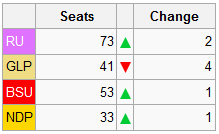Gentlemen
After reading the reports and suggestions of the Ministry of Justice, I have decided to propose to the Belgian parliament a set of measures that would improve the living conditions of Belgian people and create among them a sense of security and unity.
One of the core questions now is education. Education is everything in the society of today, it helps us to develop out potential, it decides our fates. We see a great yearn for education in our people, as recent events have proved. But currently true education is mostly a privilege for which one must pay a sum of money. We must think of that – how many people could have become talented musicians, able clerks, successful businessmen, if they were able to pay for appropriate training!
Our Holy Church educates children without asking for payment, looking only at merit and willingness to learn – and it does not have rubber, vast territorial possesions or other riches, as the state does!
Our current educational system is outdated. It was created in 1881, and sets only the the first and most basic level of it as free and compulsory. We have seen children of ten years old receiving this formal education, barely learning to read and write - but not gaining any fundamental knowledge. It is time to make a step forward and establish a
good school system, that would help our our future generation to become able workers, good citizens and patriots, as a part of democratic and Christian civilization
I propose the following amendments to the educationary bills of 1881. They would make the basic two tiers of education compulsory and free of charge and create a much more affordable higher school. If there are proposals and suggestions from my colleagues, I would, of course, glad listen to them
- Alexandre de Lannoy, Duke of Anjou-Brienne, Prime Minister of Belgium
-
Education Bill of 1892
1. The public education system shall be operated on three levels.
II. The first level shall be required to be attended by all Belgian citizens and provide the basics of education for those aged 5-10.
IIa. Students shall be taught the basics of mathematics, including addition, subtraction, multiplication, and division as well as the basics of geometry.
IIb. Students shall be taught the basics of the languages of both French and Dutch, including basic grammar and vocabulary as well as writing.
IIc. Students shall be taught basic history, specifically Belgian history, so that they may learn about their country.
III. The second level shall be required to be attended by all Belgian citizens and provide the further education for those aged 11-14.
IIIa. Students shall be taught the basics of algebra, as well as more advanced geometric concepts.
IIIb. Students shall be taught more advanced grammatical concepts pertaining to the Belgian languages as well as the development of better writing skills.
IIIc. Students shall be taught European history going back to the Ancient Romans to present day.
IV. The third level shall consist of specialized education for those aged 15-19, with students being put into schooling that suits the path they wish to take in life such as politics, the arts, industry, the military, theology, etc.
IVa. Third level schools are required to continue the teaching of more advanced mathematics and lingual concepts in addition to the specialized education they provide.
V. Schools from all three levels shall be allowed to teach additional subjects of their choosing in addition to those required by this act.
VI. The public education system shall coexist and cooperate with the established private and Catholic institutions of learning.
VII. The public education system shall not take preference of students based on religion and will not persecute students based on their religion.
VII. The teaching of religious subjects in the school would depend from the will of the parents of the pupils of each school, decided by voting.
VIII. The public education system shall be administered by the Ministry of Education.
Public Education Funding Bill of 1892
I. The funds allocated to the State Education System are to be formed through coordination between the Ministries of Education and Finance.
Ia. The Ministry of Education is to prepare a budget request, based upon the common upkeep costs and
any additional funds required for betterment, expansion, etc. of the Education system.
Ib. This Request is then sent to the Ministry of Finance to ensure requests are workable within the means of the National Budget.
Ic. As per common Budget Procedures, the Budget is finalized with approval by the Prime Minister.
II. In Regards to the Three Tiers of Education.
IIa. The First Tier and Second Tier of the Education System derives all funding directly from the national budget. These Tiers is of no cost to the students/family of students.
IIb. The Third Tier is funded by the national budget, but also requires a tuition. Tuition of the Third Tier should not exceed a cost that is deemed generally workable for a middleclass family. This cost is to be set by an Elected Regional School Board. Each Tuition is to be set by the academy of each field in question. (Schools of the Military, Science, Philosophical
Thought, Industry, etc.) and depend from the class of the school set by the Ministry of Education.
III. Scholarship Programs are to be implemented to aid the Financially Troubled and/or Academically ExcellingStudents in aiding their paying for 3rd Tier Tuition.
IIIa. Scholarship Programs may be founded through Public or Private Means.
IIIb. The finite definitions of Financially Troubled or Academic Excellence are to be determined by the
Proprietors of the Scholarship Program.
IIIc. The pioneer these programs, the Higher Education Scholarship for Promising and Meritorious Youth (HESPMY) is to be Formed.
IIIc1. The HESPMY is offered to any and all students within the top 10-15% of National
Students to fund their advanced education.
IIIc1a. Determination of the Percentage of Students being offered HESPMY
Scholarships is made during Education Budget Proposals.
-







